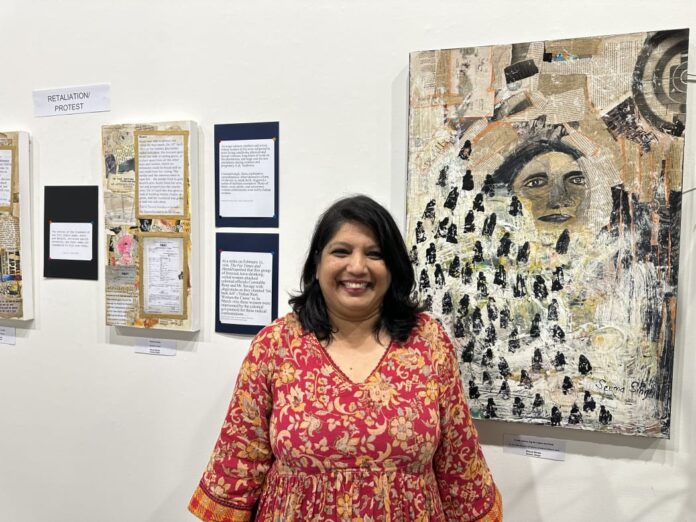Seema Singh expressed pride in her heritage, wearing saris and Indian dresses to work while embracing her identity as a Fijian and Pacific Islander
A compelling art exhibition in New Zealand’s capital is delving into the experiences of women who arrived in Fiji during the Indian indenture era, known as Girmit. Porirua-based artist Seema Singh, herself a descendant of Indian indentured laborers, has created a poignant collection of paintings that illuminate the lives of these Girmit women, rnz.co.nz reported.
Singh’s work celebrates the resilience and strength of the women among the more than 60,000 Indians brought to Fiji by British colonizers between 1879 and 1916. These individuals, known as Girmitiyas, were brought to work on sugarcane, banana, and rubber plantations, said a detailed report by RNZ.
The free event, titled “Exploring the Lives of the Girmit Women of Fiji,” is open until May 26 at the New Zealand Academy of Fine Arts Gallery on Queen’s Wharf in Wellington and will tour the country.
Originally from Nadi, Fiji, Singh moved to Porirua, Wellington, in 2007. She experienced an identity crisis, feeling caught between her Fijian upbringing and her Indian heritage. This personal struggle led her to embark on a decade-long journey to reconcile her cultural identity, ultimately discovering the often overlooked and painful stories of Girmitiya women.
In May, the 145th anniversary of Girmit—derived from the English word “agreement”—was commemorated in both New Zealand and Fiji. While May 14 has become a public holiday in Fiji, many Fijian-Indians in New Zealand are only now learning about the history of Girmit.
Singh’s art reflects on the historic arrival of the ship Leonidas on May 14, 1879, which brought 463 Indian indentured laborers to Fiji to work on sugarcane plantations. These individuals were often deceitfully recruited by the British under five-year contracts, a system many argue was a continuation of slavery under a different name.
Through nearly a year of research, Singh uncovered stories of women who arrived in Fiji under false pretenses, facing harsh realities such as prostitution, rape, and murder. With only about 35 women for every 100 men, these women endured unimaginable hardships.
“These were everyday realities for these women. There are so many stories. I just cry. People don’t know how hard the lives of the Girmit women were,” RNZ quoted Singh as saying.
“They didn’t have a voice. As a result of their sacrifices, I am able to have a voice.”
“Opportunities like scholarships and grants should be available to anyone born in the Pacific. For Indo-Fijians, Fiji is their home. Their Girmit ancestors are buried in Fiji.”
— Seema Singh
Singh hopes that her portrayal of this “painful past” will inspire important cultural shifts within the Pacific and global communities. “This journey of our ancestors has made us a unique group of people,” she said. “We cannot forget our Girmitiya ancestors who suffered and fought for future generations so we could have an equitable life with the rest of the world.”
The Fiji Girmit Foundation NZ is advocating for the official recognition of Fijian-Indians as Pacific people. President Krish Naidu emphasized the need for the New Zealand government to clarify whether Indo-Fijians can access support and resources from the Ministry for Pacific Peoples (MPP).
Singh noted that younger generations of Indo-Fijians in New Zealand struggle with their cultural identity. “If we don’t talk about us being Pasifika, younger generations will be more and more confused,” she said. Singh herself proudly identifies as a Pacific Islander, despite the challenges.
At the exhibition, many Indo-Fijians affirmed their identity as Pacific Islanders. The New Zealand Minister for Pacific People, Dr. Shane Reti, has been approached for comment on whether the government will officially recognize Fijians of Indian descent as Pacific people.
***********************************************************
Readers
These are extraordinary times. All of us have to rely on high-impact, trustworthy journalism. And this is especially true of the Indian Diaspora. Members of the Indian community overseas cannot be fed with inaccurate news.
Pravasi Samwad is a venture that has no shareholders. It is the result of an impassioned initiative of a handful of Indian journalists spread around the world. We have taken a small step forward with the pledge to provide news with accuracy, free from political and commercial influence. Our aim is to keep you, our readers, informed about developments at ‘home’ and across the world that affect you.
Please help us to keep our journalism independent and free.
In these difficult times, running a news website requires finances. While every contribution, big or small, will make a difference, we request our readers to put us in touch with advertisers worldwide. It will be a great help.
For more information: pravasisamwad00@gmail.com




